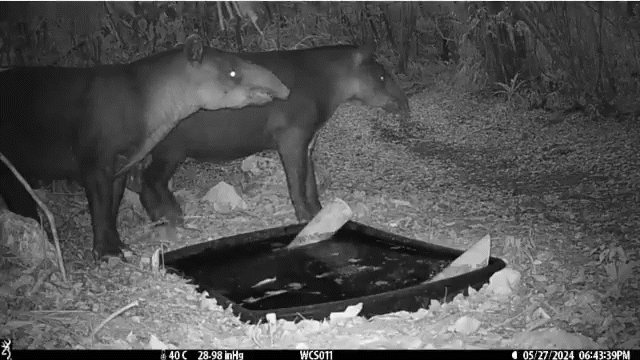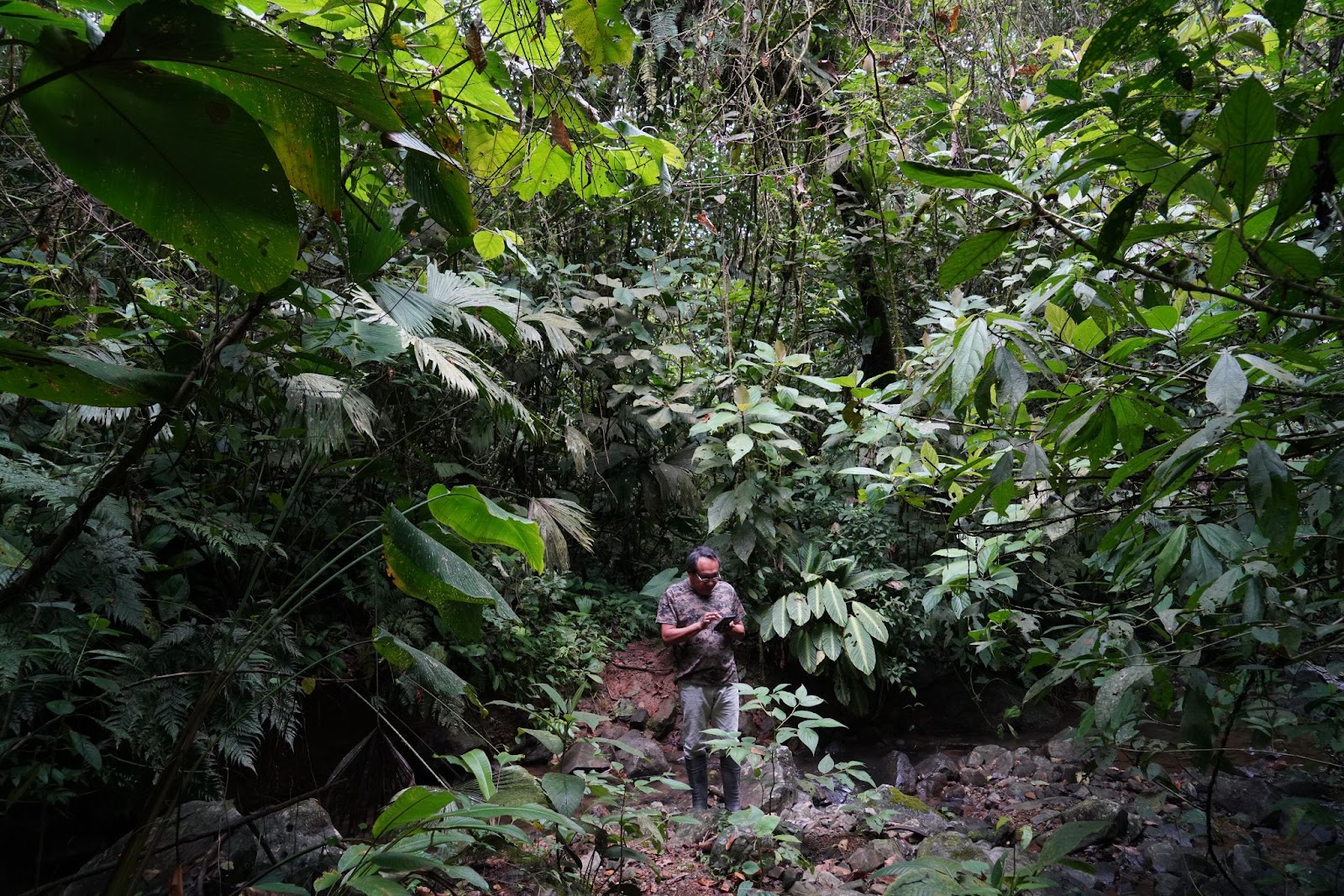Text by the WCS Mesoamerica and the Caribbean team (Guatemala, Belize and Honduras-Nicaragua)
Park ranger, forest ranger, ranger…these are some of the names given to those who watch over protected natural areas. Both in terrestrial and aquatic, as well as marine ecosystems, rangers often face complex situations and extreme weather conditions; cold, heat, rains, hurricanes, and floods, to name just a few. They play a crucial role in preventing the expansion of illegal cattle ranching, land encroachments, wildlife trafficking, fires, logging, poaching, among other threats.
That is why today on World Ranger Day, we share testimonies from rangers in Mesoamerica. With the support and collaboration of communities, organizations and governments, as well as innovative tools like SMART, rangers face these challenges with dedication and courage.

“I love being immersed in nature and above all protecting it. It is something that captivates you and that is why I can say that I love my job.”
-Luis Paguada- Moskitia ranger, Honduras.
What does it mean to be a ranger?
Getting up early, staying up late, maintaining good physical condition for long and challenging patrols by foot or boat, monitoring flora and fauna, and collaborating in scientific research are some of the activities that rangers perform. Often, the effort comes with a tremendous reward: seeing a jaguar or tapir in its natural habitat, hearing the call of macaws or witnessing the nesting of sea turtles.

“Working with sea turtles has been and will be an unforgettable experience. Knowing that I am among the many who protect these creatures for the future, brings me more joy than anything in this world. Let's prove that women can also be celebrated in history as rangers."
-Jorleen Moody- Turtle camp team leader at Cayos Perlas Wildlife Refuge.

 Left: Ranger team at the Pearl Cayes Wildlife Refuge during a day of patrolling. Photo by Karen Joseph. Right: Kurt Hyde, Ronnie Martínez, Yahaira Urbina, Michael Brakeman, Derry Harry, Maya Forest Corridor Resource Guard. Photo by WCS Belize
Left: Ranger team at the Pearl Cayes Wildlife Refuge during a day of patrolling. Photo by Karen Joseph. Right: Kurt Hyde, Ronnie Martínez, Yahaira Urbina, Michael Brakeman, Derry Harry, Maya Forest Corridor Resource Guard. Photo by WCS Belize
“Rangers embody the essence of our organization, serving as our eyes, muscles, claws, voices, ears, and brains. As a manager, I fully trust my team to grasp the intricate dynamics within the Maya Forest Corridor. They are indispensable in safeguarding this critical corridor within Belize's protected area system. They serve as protectors, educators, and thinkers.”
-Yahaira Urbina- Maya Forest Corridor (MFC) Manager, WCS Belize
“Being a ranger means a lot to me because I play an important role in conserving and protecting trees and animals for future generations.”
-Kurt Hyde- Resource Guard, WCS Belize
"I am a ranger because I love the outdoors. I am willing to go the extra mile with passion and pride in protecting the flora and fauna that cannot speak for itself."
-Derry Harris- Resource Guard, WCS Belize
A season of unprecedented droughts, fires and floods
This year, we experienced probably the most extreme weather in recent history, both due to the precipitation deficit (the largest since at least 2003) and the maximum temperature records (almost 1.5 degrees C° above the recent average).
In the words of Luis Alberto Romero Tzin, who is in charge of WCS Guatemala’s Environmental Protection program in the Corona-El Morgan area and the Laguna del Tigre National Park within the greater Maya Forest, this season's fires exceeded combat capacity.
“This year, despite preparation and capacity building, we faced very challenging months. The drought affected water sources and dehydrated vegetation was made an easy target for fire. Despite previous efforts to maintain firebreaks, clear access roads, organize and execute the fixed and mobile ground detection plan, in addition to aerial detection with drones and small plane overflights, this was not enough. Not only due to the adverse weather conditions, but also because most of the fires were intentionally provoked.”

 Left: Plot in the process of restoration in the Maya Forest. Photo by César Paz / WCS Guatemala. Right: Fire in the Yesal-San Juan sector. Photo by CONAP.
Left: Plot in the process of restoration in the Maya Forest. Photo by César Paz / WCS Guatemala. Right: Fire in the Yesal-San Juan sector. Photo by CONAP.
As of June 30, the National Coordinator for Disaster Reduction of Guatemala (CONRED), estimates that the 2024 fire season resulted in a total of 471 fires in Petén, of which 68 were classified as non-forest fires, affecting a total of 120,913 hectares.
The fires also affected the livelihoods of the communities, including restoration, timber and non-timber forestry areas. Even beekeeping, an important activity for many families, has been impacted, as it is closely linked to the integrity of ecosystems. The drought reduced flowering and therefore honey production. The fires have endangered the local economy and food security.
At the other end of the spectrum, after the fire season, communities celebrated the long-awaited first rains of June. With heavy rainfall, many of the roads were flooded, complicating ranger patrols, particularly in places like the Laguna del Tigre National Park... but the work must go on.

 Rangers in the Laguna del Tigre National Park, on a patrol day. Photo by Rony García
Rangers in the Laguna del Tigre National Park, on a patrol day. Photo by Rony García
 Wildlife captured with a camera trap, as part of the artificial water trough monitoring program in the Mirador-Río Azul National Park and Naachtún-Dos Lagunas Biotopo, in collaboration with WCS Guatemala, Fundación para el Ecodesarrollo y la Conservación (FUNDAECO), CONAP, Center for Conservation Studies (CECON) and World Wildlife Fund Mesoamerica (WWF).
Wildlife captured with a camera trap, as part of the artificial water trough monitoring program in the Mirador-Río Azul National Park and Naachtún-Dos Lagunas Biotopo, in collaboration with WCS Guatemala, Fundación para el Ecodesarrollo y la Conservación (FUNDAECO), CONAP, Center for Conservation Studies (CECON) and World Wildlife Fund Mesoamerica (WWF).
SMART, a technological ally in the field
In addition to monitoring stations and drones, SMART (Spatial Monitoring and Reporting Tool) is one of the most valuable tools used by rangers. This digital application allows rangers to efficiently collect, store and analyze data. It also facilitates the monitoring of daily activities, such as the location of animals, detection of threats and the success of conservation strategies.


By using SMART, rangers can document and report these events in almost real time, which significantly improves response capacity and decision-making based on concrete data. SMART also allows the creation of detailed maps that show patterns and trends over time, helping to identify critical areas that require priority attention. Through this application, strategic planning, optimization of frequently scarce resources, and collaboration are promoted, since the information collected can be easily shared with other conservation organizations and government authorities.
For Bianca Padilla, SMART training specialist for the binational WCS Honduras-Nicaragua program, “SMART has come to support the work of rangers, streamline the response to adverse events and demonstrate that despite the pressures of human activity and climate change on natural resources, the presence of many species of flora and fauna can still be observed. The rangers have expressed that they are happy with the use of SMART as a field data collection tool.”
Currently, the use of SMART has been extended to groups of rangers in Belize, Guatemala, Honduras, Nicaragua, Costa Rica, Panama, Cuba, Jamaica and the Bahamas.
Frontline Environmental Defenders Program
In this scenario, WCS has started the development of the Frontline Environmental Defenders Program, whose objective will be to protect the biodiversity of Mesoamerica, supporting those who risk their lives to conserve ecosystems.
This program will strengthen the effectiveness of protected areas through a holistic and inclusive approach that promotes coordination and collaboration. Through training, improved security and the use of advanced technologies, the program will provide practical support to both protected area staff and community conservation leaders, ensuring the preservation of this valuable natural and cultural heritage for future generations.
“Resource rangers are heroes who perform an invaluable service, not only for the environment, but for humanity. We must recognize their great work, and do everything possible to support them and ensure decent working conditions.”
-Julio Maaz- Coordinator of the WCS Frontline Environmental Defenders Program in Mesoamerica and SMART training specialist.
A sustainable future thanks to rangers
On this World Ranger Day, from WCS Mesoamerica and the Caribbean, we thank all the defenders who are an inspiration to everyone who works to conserve nature.
We Stand for Wildlife